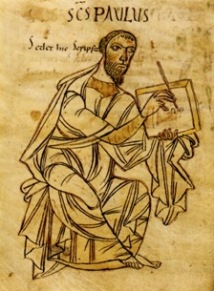“For by grace are ye saved through faith; and that not of yourselves: it is the gift of God: 9 Not of works, lest any man should boast.” – Ephesians 2:8-9
“Paul says this in case the secret thought should steal upon us that ‘if we are not saved by our own works, at least we are saved by our own faith, and so in another way our salvation is of ourselves.’ Thus he added the statement that faith too is not in our own will but in God’s gift. Not that he means to take away free choice from humanity… but that even this very freedom of choice has God as its author, and all things are to be referred to his generosity, in that he has even allowed us to will the good.”
– Jerome (c. 347-420), Epistle to the Ephesians, 1.2.8-9
“The blessed Paul argues that we are saved by faith, which he declares to be not from us but a gift from God. Thus there cannot possibly be true salvation where there is no true faith, and, since this faith is divinely enabled, it is without doubt bestowed by his free generosity. Where there is true belief through true faith, true salvation certainly accompanies it. Anyone who departs from true faith will not possess the grace of true salvation.”
– Fulgentius of Ruspe (c. 465-533), On the Incarnation, 1.
“’You are saved by grace’. For it is not because of the excellence of our lives that we have been called but because of the love of our Saviour.”
– Theodoret (c. 393–457), Epistle to the Ephesians, 2.4.5.
“So that you may not be elated by the magnitude of these benefits, see how Paul puts you in your place. For ‘by grace are you saved’, he says, ‘through faith.’ Then, so as to do no injury to free will, he allots a role to us, then takes it away again, saying ‘and this is not of ourselves.’ Even faith, he says, is not from us. For if the Lord had not come, if he had not called us, how should we have been able to believe? ‘For how’, he says, ‘shall they believe if they have not heard?’ So even the act of faith is not self-initiated. It is, he says, ‘the gift of God’.”
“God’s mission was not to save people in order that they may remain barren or inert. For Scripture says that faith has saved us. Put better: God willed it, faith has saved us. Now in what case, tell me, does faith save without itself doing anything at all? Faith’s workings themselves are a gift of God, lest anyone should boast. What then is Paul saying? Not that God has forbidden works but that he has forbidden us to be justified by works. No one, Paul says, is justified by works, precisely in order that the grace and benevolence of God may become apparent!”
– John Chrysostom (c. 347-407), Homily on Ephesians, 4.2.8, 9
“The fact that you Ephesians are saved is not something that comes from yourselves. It is the gift of God. It is not from your works, but it is God’s grace as God’s gift, not from anything you have deserved. Our works are one thing, what we deserve another.”
– Marius Victorinus (4th century), Epistle to the Ephesians, I.2.9
“All thanksgiving for our salvation is to be given only to God. He extends his mercy to us as to recall us to life precisely while we are straying, without looking for the right road. And thus we are not to glory in ourselves but in God, who has regenerated us by a heavenly birth through faith in Christ.”
– Ambrosiaster (c. 366-384), Epistle to the Ephesians, 2.10






